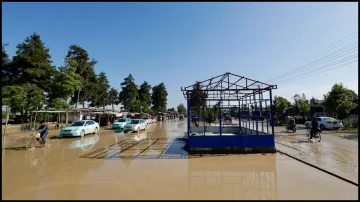Kabul: At least 50 people have been killed and several people are reported to be injured after a fresh bout of heavy rains and flooding hit Afghanistan's central Ghor province, according to authorities on Saturday. Mawlawi Abdul Hai Zaeem, the head of the information department for the central Ghor province, said the rains began on Friday and cut off many key roads in the area.
Zaeem further said there was no information about how many people were injured in the rain spell, adding that 2,000 houses were completely destroyed, 4,000 partially damaged, and more than 2,000 shops were underwater in the province's capital, Feroz-Koh. This came after heavy rains killed 315 people in northern Afghanistan last week, injuring more than 1,600 people.
On Wednesday, a helicopter used by the Afghan air force crashed due to "technical issues" during attempts to recover the bodies of people who had fallen into a river in Ghor province, killing one and injuring 12 people, the country's defence ministry said. The Russian Mi17 utility helicopters have often been used in rescue operations, including the recent floods.
Heavy rains batter Afghanistan
Thousands of homes were damaged and livestock wiped out in northern Afghanistan, the Taliban-run refugee ministry said, while aid groups warned of damage to health care facilities and vital infrastructure, such as water supply, with streets left coated in mud. In the Nahrin district of Baghlan province, people carried their shrouded dead to a gravesite.
In a statement, the Taliban's economy minister, Din Mohammad Hanif, urged the United Nations, humanitarian agencies and private businesses to provide support for those hit by the floods. Survivors have been left with no home, no land, and no source of livelihood, the World Food Organisation said. Most of Baghlan is “inaccessible by trucks,” said WFO, adding that it is resorting to every alternative it can think of to deliver food to the survivors
Abdullah Janan Saiq, the Taliban's spokesman for the State Ministry for Natural Disaster Management said that the flash floods also hit the capital, Kabul. According to him, the rescue teams, carrying food and other aid, were dispatched to the affected areas at that time. The latest disaster came on the heels of devastating floods that killed at least 70 people in April.
Afghanistan vulnerable to climate change
Afghanistan is prone to natural disasters and the United Nations considers it one of the countries most vulnerable to climate change. Afghanistan is also prone to earthquakes, as a particularly dangerous tremor killed over 2,000 people last year.
It has battled a shortfall in aid after the Taliban took over as foreign forces withdrew from the country in 2021, since development aid that formed the backbone of government finances was slashed. The shortfall has worsened in subsequent years as foreign governments grapple with competing global crises and growing condemnation of the Taliban's curbs on Afghan women.
(with inputs from agencies)
ALSO READ | Pakistan: Missile fired by a drone kills 4 members of a family near Afghan border
Latest World News
